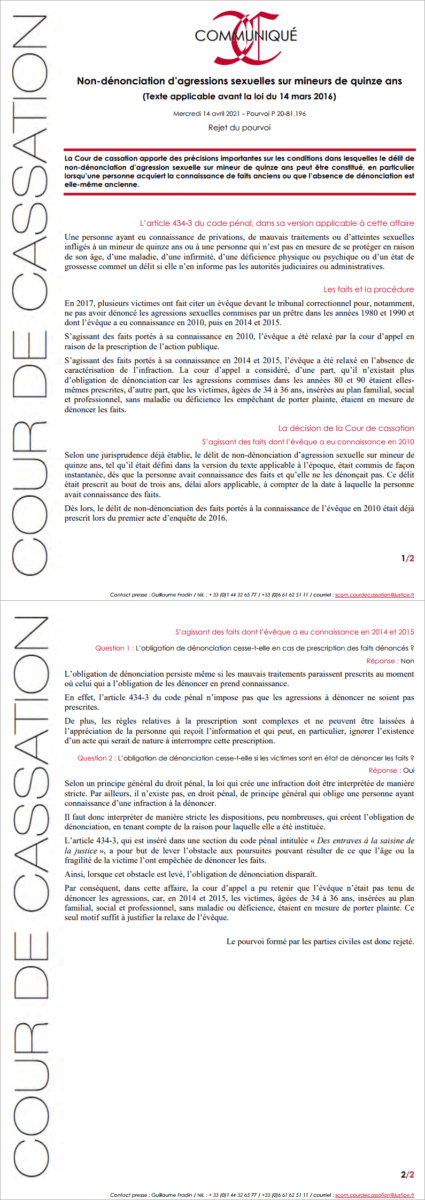French Supreme Court puts a final end to the Barbarin case
It is with immense satisfaction that our founding partner André Soulier learnt that the appeal filed by certain members of the association La Parole Libérée against the January 30, 2020 decision of the Lyon Court of Appeals of Lyon to acquit Cardinal Barbarin[1], former Archbishop, had been dismissed.
It is fortunate and salutary to see that the Cour de cassation (French Supreme Court) recalled the importance of the concept of personality and the strict interpretation of criminal law.
In a book entitled “Mes mille et une vies” published by Cherche Midi in early February 2021[2], André Soulier wrote:
“The question then arises as to how a man can be convicted for not having substituted himself for another man, a direct victim of the actions of which Bernard Preynat is accused, whereas the claimant was in full possession of his mental and physical abilities – not being a minor nor a vulnerable or endangered person – to refer the matter to the public prosecutor of Lyon.”
Any other interpretation of the law would have been a danger to our freedom.
We know that the question of freedom on other subjects is on the agenda of our society.
The communiqué of the Cour de cassation is reproduced below and an unofficial courtesy English translation follows.

Communiqué
Failure to report sexual assault on minors under fifteen years of age
(Text applicable before the law of March 14, 2016)
Wednesday, April 14, 2021 – Appeal No. P 20-81.196
Dismissal of the appeal
The Cour de Cassation (French Supreme Court) provides important clarifications on the conditions under which the offence of failure to report sexual assault on a minor under fifteen years of age can be established, in particular when a person acquires knowledge of old facts or when the failure to report itself dates back to a long time ago.
Article 434-3 of the French Criminal Code, as applicable at the material time
Any person who, having knowledge of mistreatment, deprivations, or sexual assaults or abuses inflicted upon a minor under fifteen years of age or upon a person unable to protect himself/herself due to his/her age, sickness, disability, physical or psychological impairment or pregnancy, commits an offense if he/she fails to report this to the administrative or judicial authorities.
Facts and procedure
In 2017, several victims had a bishop summoned before the criminal court for, among other things, failing to report sexual assaults committed by a priest in the 1980s and 1990s of which the bishop became aware in 2010, and then in 2014 and 2015.
With regard to the facts brought to his knowledge in 2010, the bishop was acquitted by the Court of Appeals because the prosecution was time-barred.
With regard to the facts brought to his knowledge in 2014 and 2015, the bishop was acquitted because the offence was not characterized. The Court of Appeals considered, on the one hand, that there was no longer an obligation to report because the assaults committed in the 1980s and 1990s were themselves time-barred, and on the other hand, that the victims, aged between 34 and 36, socially and professionally integrated, with no illnesses or deficiencies preventing them from lodging a complaint, were in a position to report the facts.
The decision of the Cour de Cassation
Regarding the facts of which the bishop became aware in 2010.
According to an established case-law, the offence of failure to report sexual assault on a minor of fifteen years of age, as defined in the Article applicable at the material time, was committed instantly, as soon as the person had knowledge of the facts and did not report them. The applicable limitation period was three years from the date on which the person had knowledge of the facts.
Therefore, the prosecution of the offence of failure to report the facts brought to the attention of the bishop in 2010 was already time-barred at the time of the first investigations in 2016.
Regarding the facts of which the bishop became aware in 2014 and 2015
Question 1: Does the obligation to report cease if the reported facts are time-barred?
Answer: No
The obligation to report continues to exist even if the mistreatments appear to be time-barred at the time the person who has the obligation to report such facts becomes aware thereof.
Indeed, article 434-3 of the [French] Criminal Code does not require that the assaults to be reported must not be time-barred.
Moreover, the rules governing statutes of limitations are complex and cannot be left to the discretion of the person who receives the information and who may, in particular, be unaware of the existence of an action which would be likely to interrupt the applicable statute of limitations.
Question 2: Does the obligation to report cease if the victims are able to report the facts?
Answer: Yes
According to a general principle of criminal law, the law that creates an offence must be interpreted in a strict manner. In addition, there is no general principle in criminal law that obliges a person who has knowledge of an offence to report it.
The few provisions that create the obligation to report must therefore be interpreted strictly, taking into account the reason for which they were instituted.
Article 434-3, which is incorporated in a Section of the [French] Criminal Code entitled “Obstacles to bringing a case to court”, is intended to remove the obstacle to prosecution that may result from the fact that the age or fragility of the victim has prevented him/her from reporting the facts.
As such, when this obstacle is removed, the obligation to report ceases.
Therefore, in the case at hand, the Court of Appeals was able to find that the bishop was not obliged to report the assaults because, in 2014 and 2015, the victims, aged between 34 and 36, integrated on the family, social and professional levels, without illness or deficiency, were able to file a complaint. This reason alone is sufficient to justify the acquittal of the bishop.
The appeal lodged by the civil parties is, therefore, dismissed.
[1] See our article entitled Acquittal of Cardinal Philippe Barbarin: A victory for Soulier Avocats published on our Blog in January 2020
[2] See our news on the upcoming release of the book authored by our founding partner André Soulier entitled “Mes mille et une vies” published in January 2021
 Strategic Lawyering
Strategic Lawyering 